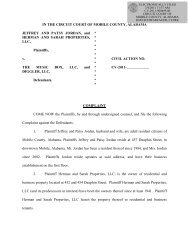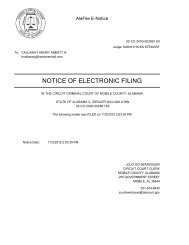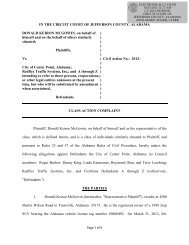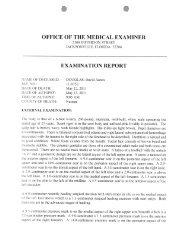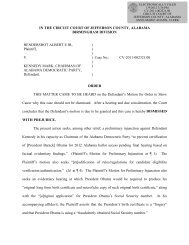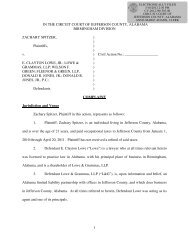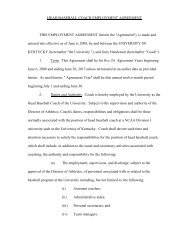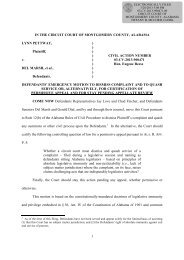Sentenced to Stigma: Segregation of HIV-Positive Prisoners - AL.com
Sentenced to Stigma: Segregation of HIV-Positive Prisoners - AL.com
Sentenced to Stigma: Segregation of HIV-Positive Prisoners - AL.com
Create successful ePaper yourself
Turn your PDF publications into a flip-book with our unique Google optimized e-Paper software.
South Carolina is the only US state that maintains an absolute prohibition on access <strong>to</strong> workrelease for prisoners with <strong>HIV</strong>.<strong>Segregation</strong> policies reflect outdated approaches <strong>to</strong> <strong>HIV</strong> that no longer have any rationalbasis in science or public policy. In the early days <strong>of</strong> the <strong>HIV</strong>/AIDS epidemic, fear andignorance led <strong>to</strong> severely restrictive public policies, including quarantine and segregation inprisons. In 1985, for example, 46 <strong>of</strong> 51 state and federal prison systems segregated <strong>HIV</strong>positiveprisoners. As science and societal attitudes evolved, however, prison <strong>of</strong>ficialseliminated these policies. By 1994, only six prison systems had segregation policies, and by2005, that number was down <strong>to</strong> the three states examined in this report. Today, integration<strong>of</strong> prisoners with <strong>HIV</strong> in<strong>to</strong> the general population is the national norm and representsgenerally accepted best practice in correctional health.<strong>Segregation</strong> <strong>of</strong> prisoners living with <strong>HIV</strong> without basis in science or public policy cannot bejustified under human rights treaties ratified by the United States. Discrimination againstprisoners with <strong>HIV</strong> not only violates human rights law but contravenes international and USguidelines for management <strong>of</strong> <strong>HIV</strong> in prisons. Moreover, additional violations <strong>of</strong> humanrights flow from the fact <strong>of</strong> segregation and <strong>com</strong>pound the harsh consequences <strong>of</strong> this policyfor <strong>HIV</strong>-positive prisoners: involuntary disclosure <strong>of</strong> <strong>HIV</strong> status <strong>to</strong> family, staff and otherprisoners; loss <strong>of</strong> liberty by assignment <strong>to</strong> higher security prisons; denial <strong>of</strong> work, programand re-entry opportunities; and policies that promote, rather than <strong>com</strong>bat, fear, prejudiceand even violence against persons living with <strong>HIV</strong>. These and other conditions documentedin this report go well beyond discrimination. Viewed cumulatively, conditions for <strong>HIV</strong>positiveprisoners in Alabama and South Carolina constitute cruel, inhuman and degradingtreatment <strong>of</strong> prisoners.This report is a collaborative effort by Human Rights Watch and the American Civil LibertiesUnion National Prison Project (ACLU-NPP). The project was, <strong>to</strong> a great degree, informed bythe extraordinary his<strong>to</strong>ry <strong>of</strong> the ACLU-NPP in advocating for the rights <strong>of</strong> <strong>HIV</strong>-positiveprisoners in these states for more than two decades. Throughout that time, <strong>HIV</strong> segregationpolicies have been controversial, contested, and intertwined with other fundamental issues<strong>of</strong> human and civil rights, including the right <strong>to</strong> adequate medical care and humane livingconditions. For this report, Human Rights Watch, ACLU-NPP, and local ACLU affiliatesconducted interviews <strong>of</strong> current and recently released prisoners in order <strong>to</strong> document thecontemporary impact <strong>of</strong> continued housing segregation and ongoing inequality in access <strong>to</strong>jobs, programs, and work release opportunities. Human Rights Watch also interviewed<strong>HIV</strong>/AIDS service organizations providing education and counseling services inside theprisons, and <strong>com</strong>munity leaders, legisla<strong>to</strong>rs, and others engaged in <strong>HIV</strong> policy issues in the<strong>Sentenced</strong> <strong>to</strong> <strong>Stigma</strong> 2



